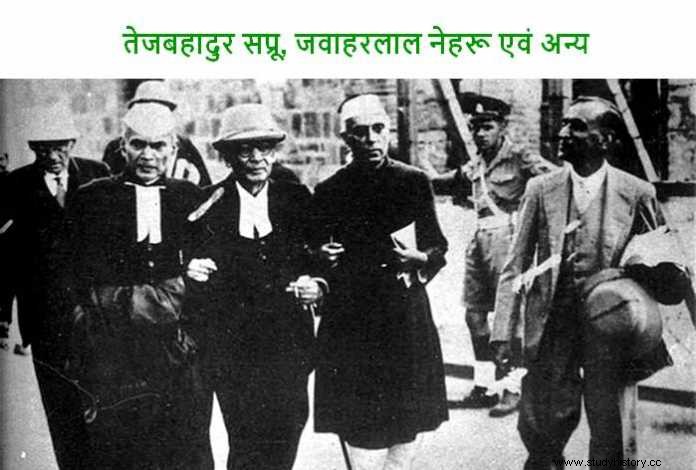
Sapru Yojana
In December 1944 a committee was constituted under the chairmanship of Tej Bahadur Sapru. On the question of whether the provinces and states should join or remain separate from the proposed Indian Union, the Committee recommended that no province of British India would have the option of not joining the Union. Whether a province of British India or a native state, once acceded to it, it will not have the right to secede from the Union. The way British-India cannot accept the separation of any British-Indian province, in the same way it cannot allow the native states.
There was no representation of the states in the Sapru Committee, so the committee did not make any recommendation regarding the princely states other than joining the Union of their own free will. It was also recommended by the committee that as far as possible the head of state should be elected from among the rulers of the states. Along with this, there should also be a provision for the post of ministers of the states, for whose assistance there is an advisory committee of the states. According to the concept of Sapru Samiti, the Union of India would be a single state consisting of federal units whether of provinces or states. There will also be states unaffiliated to the Union. No foreign power will have any right over these units whether they join the Federation or not.
Proposal of the Radical Democratic Party
On behalf of the Radical Democratic Party, M.N. Rai drafted the constitution of independent India. This draft was endorsed by the All India Conference of the Radical Democratic Party on 6 January 1945, in which it was said that the interim government should announce a constitution for the whole of India and it should also be applied to the Indian princely states.
This should be done through bilateral treaties between the British government and the Indian kings in the past, through which the Indian kings would have to surrender their rights to the Indian government in exchange for some financial grants.
Proposals from other scholars
Pro. Coupland presented a plan of territorial division according to population on the basis of rivers. Sir Sultan Ahmed presented the plan of Indo-Pak partition through a treaty between India and the United Kingdom. In this, no position was clarified about the native states.
In 1943-44, Ardeshir Dalal, Dr. Radha Kumud Mukherjee and Dr. Bhimrao Ambedkar also presented their plans, in which efforts were made to find a solution to the communal problem of India, but in all these plans, the problem of the native states was not given much importance. given.
Rajagopalachari Platform
Gandhi was released from prison on 6 May 1944. With this the Quit India Movement also ended. The leaders of the Liberal Party, Tej Bahadur Sapru and Rajagopalachari, tried to negotiate a settlement between Gandhi and Jinnah by talking to the leaders of the Congress and the Muslim League. The Communist Party of India also wanted Gandhi and Jinnah to fight for India's independence and not waste the country's power by fighting against each other.
That's why the Communist Party of India raised a slogan across the country - 'Gandhi-Jinnah meet again' , These efforts showed results and Rajagopalachari prepared a proposal in which the following points were included-
(1) During the war the Muslim League should support the demand for complete independence and cooperate with the Congress in forming a provisional interim government for the transition period.
(2) After the war a commission should be appointed to determine the extent of the areas of Muslim majority. shall be decided by referendum or by any other form of general vote of all residents of those areas whether they should become a separate state or not.
(3) All the parties shall have the right to support their respective point of view before the referendum. If there is separation, then the two states should compromise for defence, business and other purposes.
(4) Any transfer of population shall be purely on voluntary basis.
(5) These conditions will apply only when Britain transfers all power and responsibility of the governance of India.
On the basis of this proposal, talks between Gandhiji and Jinnah started in Bombay on 4 September 1944, which continued till 17 September. This conversation was very secret and took place through the exchange of letters. These letters were published after the completion of the conversation. This conversation failed. The reason for the failure was Jinnah's stubbornness. Jinnah wanted the Congress to agree that Pakistan would be established even before any kind of referendum was held and during the British Raj.
Jinnah also said that the whole of Punjab, the whole of Bengal, the North-West Frontier Province, Balochistan and Assam will have to be included in Pakistan. Gandhiji was not ready to give Pakistan to Jinnah at any cost. So the talks failed and the whole country was deeply disappointed by this failure.
